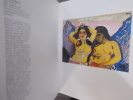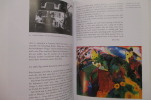7 books for « annegret hoberg »Edit
-
Language
English (1)
French (5)
Italian (1)
-
Topics
Architecture (2)
Arts pc (2)
Fashion (1)
Fine arts (3)
Flemish (1)
Foreign languages (1)
Italian (1)
Surrealism (1)
War (2)
-
Countries
Belgium (3)
France (4)
-
Syndicate
ILAB (3)
SLAM (3)
Hans-Peter Wipplinger.; Annegret Hoberg, Lena Scholz; August Ruhs, Burghart Schmidt,
Reference : 58935
ALFRED KUBIN : Confessions of a Tortured Soul
, Walther Koenig Verlag (Thames) 2022, 2022 Hardcover, 288 pages, ENG, 285 x 240 mm, New, illustrations in colour, . ISBN 9783753301983.
The art of the great draftsman, illustrator and author of the novel The Other Side, Alfred Kubin, appears more current today than ever before: for it was violence, wartime destruction, pandemics, natural disasters, the manipulation of the masses and other abysses of human existence that pervaded his highly narrational works. The oeuvre of this fantastical creator confronts us with pessimistic visions which - to quote Schopenhauer - delineate "the worst of all possible worlds". Kubin's childhood and adolescence was shaped by setbacks and depression - he was dismissed from high school, abandoned his photography apprenticeship, lost his mother at an early age, attempted suicide at her grave and suffered a nervous breakdown after a short stint in the military. These are only some of the blows of fate that characterize his traumatic biography. Kubin found relief by moving to Munich in 1898, where he began to study art. His first visit to the Alte Pinakothek left him "filled with astonishment and ecstasy". He described seeing Max Klinger's etchings as a "cascade of visions of black and white images". As we know from his biographical notes, he subsequently familiarized himself "with the entire graphic oeuvre of Klinger, Goya, de Groux, Rops, Munch, Ensor, Redon and comparable artists". It was from this variety of impressions and artistic positions, but especially from his own empirical and emotional worlds and unbridled imagination, that Kubin created his unparalleled, mysterious-fantastical oeuvre. The exhibition at the Leopold Museum is the first to attempt an exploration of Kubin's oneiric worlds - which all too often enter nightmarish-somber spheres - in terms of their relation to the unconscious and the deep dimensions of the psyche. In this interpretation attempt, the psychoanalyst and psychiatrist August Ruhs will orient himself on works by Kubin selected by curator Hans-Peter Wipplinger with specific thematic emphases in mind. Kubin's works are placed into a dialogue with works by artists of the 19th century and of Classical Modernism from which Kubin derived inspiration for his oeuvre. Kubin's dystopian visualizations, which carry on from Symbolism and the fantastical art of the 19th century and may be considered precursors to French Surrealism, are composed of actual and imaginary reality: an ingenious synthesis, in which the uncanniness of these pessimistic realms is often seasoned with humor, irony and exaggeration.
Blaue Reiter : im Lenbachhaus M nchen
, Prestel, 2004 Paperback, 328 seiten, Deutsche edition, 300 x 230 mm, in Gute kondition, illustrationen in Farbe / s/w. ISBN 9783791360164.
Der Blaue Reiter (kurz ?K nstlergemeinschaft Der Blaue Reiter?) wurde 1911 von Wassily Kandinsky, Franz Marc, August Macke und Alexej von Jawlensky gegr ndet. Die Bewegung gilt als Expressionismus. Es gab keine wirklich organisierte Bewegung. Den Teilnehmern ging es mehr um die Aufrechterhaltung einer freundschaftlichen Bindung. Die neuen Kunstideen der Gruppe wurden 1912 in M nchen vom Verleger R. Piper im Almanach ?Der Blaue Reiter? ver ffentlicht. Alle Gr nder der Gruppe waren in dieser Ausgabe mit Arbeiten vertreten. Der Name der Gem ldegruppe geht auf das Cover dieses Almanachs zur ck, das Kandinskys Gem lde ?Der Blaue Reiter? aus dem Jahr 1903 zeigt. Die Trennung von der Neuen K nstlervereinigung im Jahr 1911 f hrte zu einer Wanderausstellung, Die erste Ausstellung der Redaktion des Blauen Reiters. Von der Galerie Tannh user in M nchen aus besuchten wir die Galerie Der Sturm in Berlin und das Folkwang Museum in Hagen. Als n chstes folgten K ln und Frankfurt.
Franz Marc: La retrospettiva
, Prestel, 2005 Hardcover, 336 pages, ITA edition , 285 x 250 x 32 mm, Nuovo, illustrated in colour / b/w. ISBN 9783791335797.
Franz Moritz Wilhelm Marc (Munich, February 8, 1880 - Braquis, March 4, 1916) was a German expressionist painter. Marc mainly focused on animal portraits, where he tried to capture not so much the external appearance, but the inner essence of the animal. The color symbolism he developed played a major role in this. For example, blue stood for "the male principle, stiff and spiritual" and yellow for "the female principle, soft, cheerful and sensual". Under the influence of Cubism, he also greatly simplified the forms. As a result, his paintings tended increasingly towards the abstract. His latest works clearly refer to the true expressive power of abstract expressionism.
Phone number : 04 76 97 79 28
CAPOLAVORI DELL'ESPRESSIONISMO TEDESCO. Dipinti 1905-1920.
1986 / 158 pages. Broché. Editions Electa.
Bon état.
WASSILY KANDINSKY und GABRIELE MÜNTER in Murnau und Kochel 1902-1914.
2000 / 159 pages. Broché. Editions Prestel
Very good condition.
Der Blaue Reiter und das neue Bild. Von der "Neuen Künstlervereinigung München" zum "Blauen Reiter".
München, Prestel, 1999 In-4, broché, couverture illustrée, 400 p., nombreuses figures en couleurs et en noir.
Accroc au dos, sinon bon état. -
 Write to the booksellers
Write to the booksellers







